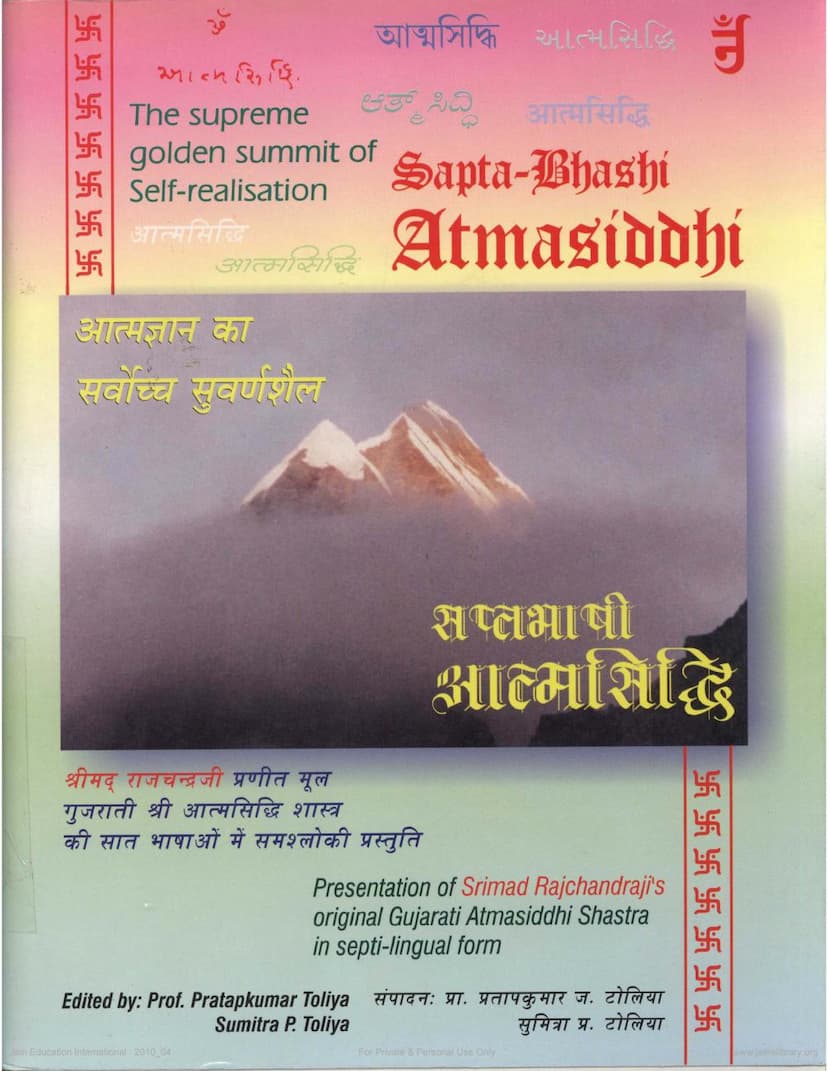Sapta Bhashi Atmasiddhi
Added to library: September 2, 2025

Summary
The book "Sapta-Bhashi Atmasiddhi" is a multi-lingual presentation of Srimad Rajchandraji's original Gujarati "Atmasiddhi Shastra." This profound spiritual treatise, composed in 142 verses, is presented in seven Indian languages: Sanskrit, Hindi, Marathi, Bengali, Kannada, English, and the original Gujarati. It is described as the "supreme golden summit of Self-realisation" and the "Atmanopanishada" by various spiritual luminaries.
Key Aspects of the Book and Atmasiddhi:
-
Author and Context: Srimad Rajchandraji, a spiritual guide to Mahatma Gandhi, composed "Atmasiddhi" in a single sitting in 1896. It is considered a timeless work that transcends religious boundaries, offering the essence of Indian spirituality. The book's publication is dedicated to the 2600th birth anniversary of Bhagavan Mahavira and the Param Samadhi Centenary of Srimad Rajchandraji.
-
Content and Significance: "Atmasiddhi" is a dialogue between a realized master and an inquiring student, delving into the fundamental philosophy of the soul. It provides a scientific approach to self-realization, encapsulating the core principles of Indian spirituality. The work is praised for its clarity, precision in language, and enchanting style. It is seen as an "ocean of knowledge" condensed into "142 nectar-drops."
-
Multilingual Presentation: The "Sapta-Bhashi" aspect highlights the effort to make this profound text accessible to a wider audience by translating it into multiple languages. This collaborative effort involves various scholars and translators, with Professor Pratapkumar J. Toliya and Sumitra P. Toliya serving as the editor and co-editor, respectively.
-
Inspiration and Guidance: The book acknowledges and is "Inspired By" several great spiritual figures, including Sri Sahajanandaghanji (Bhadra Muni), Padmabhooshan Dr. Pandit Sukhlalji, Atmagyani Mataji Dhandeviji, Vidushi Sushri Vimala Thakar, and Acharya Gurdial Mallikji. Their influence and encouragement were instrumental in bringing this septi-lingual edition to fruition.
-
Core Teachings of Atmasiddhi (as reflected in the verses):
- The Nature of the Self: The text emphasizes that the soul (Atma) is distinct from the body, senses, and mind. It is eternal, pure consciousness, and the true seer.
- Ignorance and Bondage: The primary cause of suffering is ignorance about the true nature of the self and attachment to the material world. Concepts like Raga (attachment) and Dwesha (aversion) are identified as root causes of bondage.
- The Role of a True Guru: The importance of a living, realized spiritual guide (Sadguru) is stressed for understanding the path of self-realization. Scriptural knowledge alone is insufficient without the guidance of a true master.
- The Path to Liberation: The path to liberation (Moksha) involves self-knowledge, detachment from worldly desires, the eradication of ignorance, and the practice of virtuous conduct (Ahimsa, Anekanta, etc.).
- Distinction between True and False Paths: The text distinguishes between genuine spiritual seekers (Atmaarthi) and those who are merely sectarian or dogmatic (Matarthi), highlighting the characteristics of each.
- The Nature of Karma: Karma is presented as a process driven by one's own actions and mental states, rather than an external force or divine decree. The cessation of karma leads to liberation.
- The "Six Tenets" (Shatpadas): The dialogue explores six fundamental tenets concerning the soul's existence, eternity, agency, experience, liberation, and the means to achieve it.
-
Impact and Influence: The book details the profound influence of Srimad Rajchandraji and "Atmasiddhi" on Mahatma Gandhi, describing Gandhi's deep reverence for Rajchandraji as his spiritual guide. It also highlights the editor's (Prof. Pratapkumar Toliya) journey and the pioneering work of Vardhaman Bharati International Foundation in spreading Jain teachings through music and literature.
In essence, "Sapta-Bhashi Atmasiddhi" is a comprehensive effort to disseminate the timeless wisdom of Srimad Rajchandraji's "Atmasiddhi Shastra" across linguistic barriers, offering profound insights into self-realization and the path to spiritual liberation, accessible to all seekers of truth.